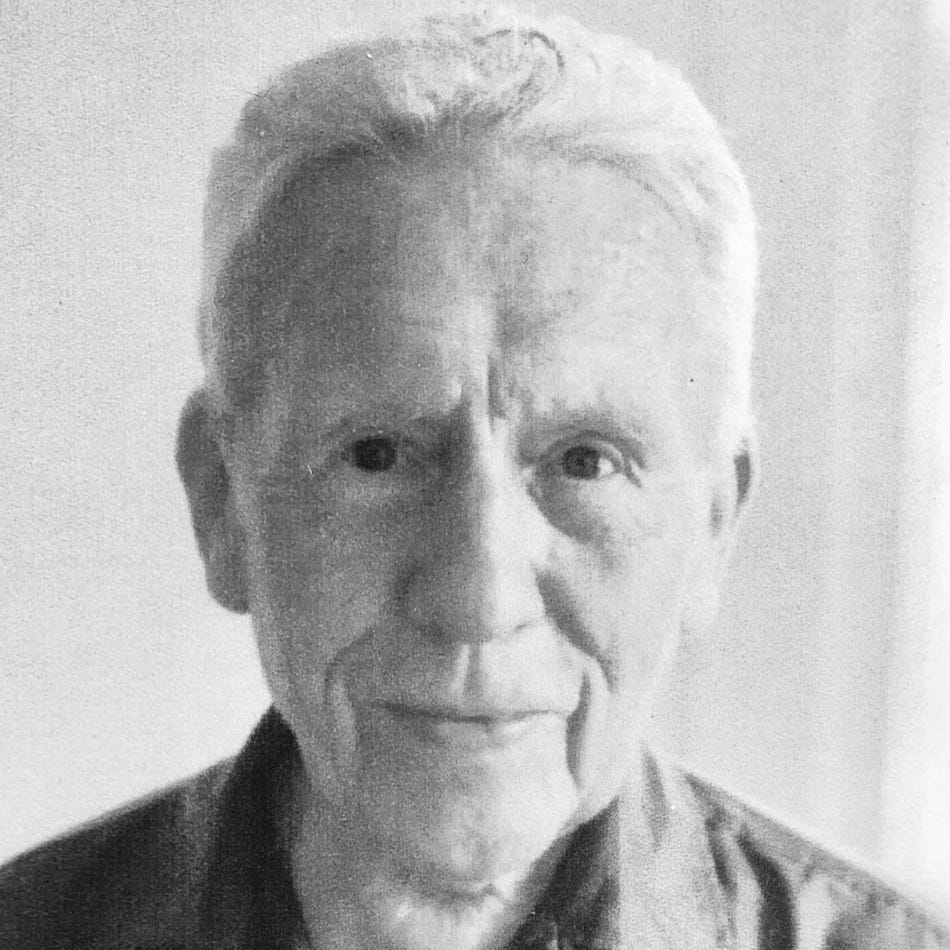Shamcher Week
Special Remembrance
The end of April is marked by the dates of Shamcher’s birth (April 26, 1896) and his passing (April 29, 1980).
In years past, the remembrance has been both formal and informal. Some with just a reminder reiterating the call to take some of his approach into our own life paths. That is the impulse behind The Shamcher Bulletin - to share his approach and world-view with those who can see that formal activity, though helpful for some, or for a certain time, is no longer the thing. Just as he donated his body to science, it looks like he has dissolved into the marvelous mysterious universe, leaving us to solve our problems by ourselves. As he told Sabira, “When I die, Sabira, I will not reincarnate. I will have become dissolved in the Universe.”
Yet how do we explain the equally mysterious communication that continues on, active and living? Could it be that he never left? Or was he never here in the first place? There is paradox and mysticism in this reality: in life he often said, “I don’t exist,” yet somehow we may feel that he exists more than ever.
Past issues of the Bulletin have featured articles and memories at this time of year. Here’s last year’s Birthday note:
This week is also a good time to reread this 40th anniversary Remembrance issue with memories from his son, and other close Sufis.
Last April, we honoured his Urs with a virtual meditation time together on the 29th, the day of his Urs. This year, the remembrance opens to each of us depending entirely upon our receptivity. Informal and free-form “intuition meetings” such as this need not be rare, or based in the calendar. Yet still, in this last week of April, each year we find our own way to remember him, think of his work, and be in touch in intuition. We remember Shamcher, with ineffable gratitude.
Inayat Khan in Norway
Hazrat Inayat Khan wrote in his diary (1923-1926):
I gave some lectures in the University of Christiania and for the Theosophical Society there. Destiny brought me together with a soul who belonged to us; I only had to go to Christiania in order to find her. It was Fröken Susanna Kjösterud, a soul whose heart was open to the Message. The Message only had to reach there in order to find response in her. Those who became interested in my teaching, including Herr Björset1, formed a group in Oslo, which was carried by Fröken Susanna Kjösterud. I found a different atmosphere in Norway from that I had felt in Stockholm. People there seemed to be of democratic spirit and they responded more readily to the Message. I went from there to Bergen, a beautiful place near mountains. The atmosphere in that place helped my lectures to make a greater and deeper impression upon the people there. Fröken Thistle and some others became mureeds, and the work has been continued there since then.
Inayat in Bergen
A fascinating extensive article Guest Room : Inayat in Bergen sheds more light on these early days.
One day, while exploring the closed stacks of the University in Bergen, where she works as a conservator, Nirtan Pasnak made an astonishing discovery : a well used German edition of “The Soul Whence and Whither” by Hazrat Inayat Khan. Tucked in an envelope at the back of the book was a photo of Pir-o-Murshid, such as were sometimes given to mureeds when they were initiated. …. Read the full article in The Inner Call
Shamcher’s Early Writing
(The article in The Inner Call goes on to mention Shamcher’s early writing….)
In the early 1920’s Shamcher was very active in the Theosophical society, travelling around Norway and giving lectures, and his book Klodens Sang [Song of the Globe] was published in 1923, before he met Inayat. Miraculously, this book is also in the University Library in Bergen.
Here is an excerpt that explains the closeness of thinking and feeling Bjørset had with that of Murshid and why this connection was so immediately established:
Do you have a garden, where you are a gardener or a priest? Where fruits and roots grow and thrive under the care of your hands, where the branches of trees bend down to you in happiness? Do you believe that they are longing only for the earth and water? Don’t you know that they have a strong longing to be enveloped by the warmth of your personality, to bathe themselves in the rays of sympathy that radiates from you?(translation from Norwegian from Brynjolf Bjørset, Klodens Sang, Olaf Norlis Forlag, Kristiania 1923, p.15)
Shamcher interviewed by Wali Ali
A few brief excerpts from - Interview with Shamcher Bryn Beorse—12/14/75
Let me first mention that there was something we called "Suresnes Sickness," and that was a feeling some people had when they had been there for awhile, and they felt very insignificant and they felt they didn't know anything, and they had come there in great expectations of expanding their ego. And, instead of that, their ego was negated.
****
When a disciple feels that he is fulfilling the mission given to him by his teacher, then he feels a successor; and in that sense every teacher has had successors, in plural. And sometimes in his enthusiasm, and perhaps to simplify things, such a disciple writes that he is the successor—and he is right in that sense—but if he refuses another who also feels that he's a successor, he may be wrong. There are successors; some of them may be, from the eternal point of view, even greater than a teacher, who knows? But they are not the same as the teacher; they don't represent him in all spheres and in all senses. And in that sense there is a succession. But if any one of these claims to be the One Successor, then he repudiates a great amount of disciples— perhaps in some cases, everybody but himself. The great world teachers, Jesus—who was his successor? John, Peter, Paul? Of course none of them, but all of them. Buddha, who was his successors? The Hinayanists? the Mahayanists? the Zens? Not any one of them, not any one disciple, but all of them, and yet none of them in the full sense of the consciousness and the characteristics of the Buddha. Who was the successor of Mohammed? Immediately after his death there were two entirely different sects, hostile sects. And today there are many more. So the matter of succession is a personal thing; it is, as the Sufis say, "The disciples make the teacher, and when the disciple feels that he has made the teacher, he is in his own consciousness the successor, and to some extent in the outer world, a successor."
Thanks for responding, sharing, and subscribing to these excerpts from the archives of Shamcher Bryn Beorse.
Feel free to reply to this post if you have any Shamcher stories, photos or correspondence to share.
The Shamcher Bulletin is edited by Carol Sill, whose newsletter, “Personal Papers”, is HERE.
If you like this post, please click the heart. And your comments are always welcome.
Herr Björset - later given the Sufi name of Shamcher. Shamcher - from the Wali Ali Interview 12/14/75 said: “[H}alf a year after I was made a mureed, Inayat Khan and I sat together in an interview, and he said, " Shamcher, do you know, this name just now came from God. It means 'the sword of the Message, the tongue of flame'; it means that—I see that millions will be against you and millions for you. You are the one who will make the Message great and break through in a word." And at that time I was young and very ambitious enough, and I thought, "Oh, of course, I will be the man." And then I found very soon how small the response was, and even my most intelligent friends would say, "Huh? What do you mean? A general religion? Ha: Embracing all?" And they would laugh. And I felt so ashamed and so humbled in relation to this great thing that he had told me that I felt I would never amount to anything, all of these things wouldn't happen. So I laid low. I tried always again and again, and nothing much happened. And only a few years ago, there was a tremendous increase and expansion of the Sufi Order in Seattle where I was then located. And then I began to see how my connection with Sam, he and I, and my connection with Vilayat, and all these began to form into a, may I say, a tremendous bubble. And I don't think half of it has been realized yet. I begin to see these millions for and against now and how it develops. And it comes back to me that Pir-o-Murshid Inayat Khan once looked to me and said, "Shamcher, how old are you now?" That was just before he passed away. "Oh, 29," I said. "29—quite young, quite young. There's a long way to go, isn't there?" So he sort of gave that impression to me, that it would take a long time.





Thank you for keeping Shamcher alive in this way. He is present with me like a conscience.
Hu.